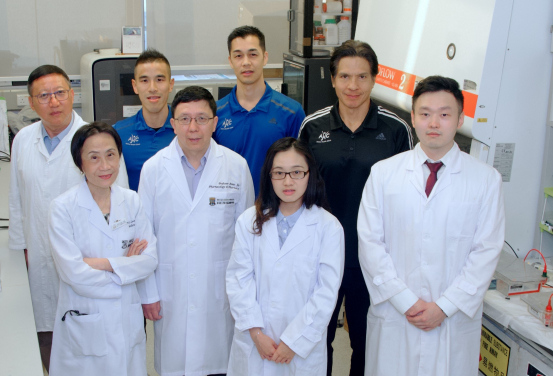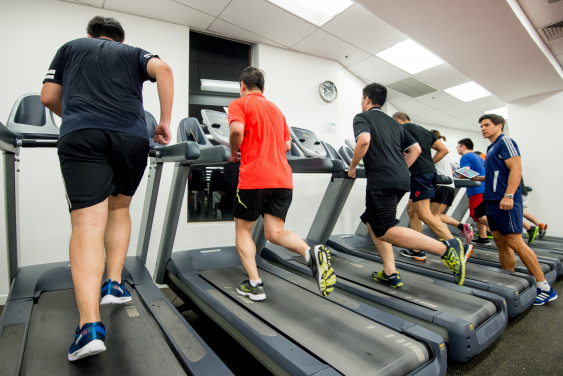Media
HKU discovers gut microbiota and its metabolites as key factors
for exercise efficacy in the prevention of diabetes
28 Nov 2019
A collaborative research team of various departments under the LKS Faculty of Medicine, The University of Hong Kong (HKUMed); the Centre for Sports and Exercise (HKU); Hans Knoll Institute (Germany) and Guangdong Pharmaceutical University (China) have discovered that exercise promotes divergent compositional and functional shifts in gut microbiota between exercise responders and exercise non-responders. Novel data offer new insight into the relationship between gut microbiota and one’s ability to respond to exercise and its metabolic effects. Additionally, the “exercise-conditioned” microbiota transferred from responders into obese mice aided in the reduction of blood sugars. The findings demonstrated that the right mix and diversity of gut microbiota can have a very influential effect on individuals’ metabolic health and the degree to which they respond to the low-cost lifestyle intervention of exercise. The study is published in Cell Metabolism (Link to the publication), a top-tier and internationally recognised academic journal.
Background
Type 2 diabetes and its complications are the leading causes of morbidity and mortality worldwide. Exercise is the most cost-effective lifestyle intervention for the prevention and treatment of diabetes. However, the clinical implementation of exercise as an effective intervention has been hindered by the phenomenon of exercise resistance (i.e., some individuals have no response or even adverse responses to exercise when it comes to their metabolic health).
Research Methodology and Findings
After screening 771 volunteers from the local community, 39 Chinese men with impaired glucose metabolism (prediabetes) who did not take any medication volunteered to participate in a 12-week supervised exercise training intervention. After undergoing a similar but individualized exercise programme, all the participants exhibited a similar degree of body weight and fat mass reduction. Despite these important changes that are widely recognised as being valuable in improving glucose metabolism, only 70% of the participants responded well and demonstrated significant improvements in glucose metabolism and insulin sensitivity (“responders”), whereas the remaining 30% were not responsive to exercise (“non-responders”). Through an advanced integrative analysis, the team discovered obvious differences in exercise-induced alterations in gut microbiota and its metabolites at both the compositional and functional levels between responders and non-responders. The team found that the post-exercise microbiome of responders were active in breaking down amino acids that promote insulin resistance, which is beneficial to individuals looking to improve or optimise their blood glucose profile. Conversely, a different set of microbiome were found in post-exercise non-responders, which resulted in the breaking down of substances that promote insulin sensitivity. Again, for individuals who wish to improve their blood glucose profile, their microbiome was found to be working counter to their intended exercise objective. When transplanting the participants’ gut microbes into obese mice, blood-sugar levels dropped in the mice that received post-exercise microbiomes from responders, whereas animals receiving bacteria from non-responders showed no such improvement. More interestingly, oral supplementation with short-chain fatty acids restored the ability of gut microbiota from “exercise non-responders” to improve glucose metabolism and insulin sensitivity. Furthermore, a prediction model based on microbiota and its metabolites before exercise accurately predicted personalised glycemic responses to exercise in another 30 subjects with prediabetes.
Significance of the study
This study suggested that microbiota and its metabolites serve as an important contributor to the metabolic benefits of exercise intervention, and also identified maladaptation of gut microbiota as a “culprit” for those individuals who do not respond to exercise intervention. Furthermore, gut microbiota can provide important insight into whether one could benefit from exercise or whether additional modulations targeting the gut microbiota are needed to boost one’s health and assist with being more responsive to exercise.
This is one of the first interventional RCT studies providing clear evidence of the role of gut microbiota on metabolic health. These findings also offer new insight for clinicians and exercise specialists to target the microbiota of exercise non-responders as another means of better enhancing therapeutic interventions.
About the research team
The research was led by Professor Xu Aimin, Chair Professor of Metabolic Medicine, Department of Medicine, Chair Professor of Department of Pharmacology and Pharmacy and Director of the State Key Laboratory of Pharmaceutical Biotechnology, HKU, and conducted by a group including co-corresponding authors, Dr Michael Tse, Assistant Director of the Centre for Sports and Exercise, HKU and Dr Gianni Panagiotou, Associate Professor, Head of Systems Biology and Bioinformatics, Leibniz Institute for Natural Product Research and Infectious Biology, Hans Knoll Institute. Post-doctoral fellows Dr Liu Yan and Dr Wang Yao of the Department of Medicine, HKUMed, and Dr Ni Yueqiong, post-doctoral fellow, School of Biological Sciences, Faculty of Science, HKU, three of whom contributed equally to the work as first authors. Other research team members of this study include: Professor Karen Lam Siu-ling, Rosie TT Young Professor in Endocrinology and Metabolism, Chair Professor in Medicine, Department of Medicine, HKUMed and Clinical Director of the State Key Laboratory of Pharmaceutical Biotechnology, HKU; Dr Cynthia Cheung Kwan-yui, post-doctoral fellow, Department of Medicine, HKUMed; Professor Wang Yu and Dr Xia Zhengyuan, State Key Laboratory of Pharmaceutical Biotechnology, HKU; and Professor Ye Dewei and Professor Guo Jiao, Joint Laboratory between Guangdong and Hong Kong on Metabolic Diseases, Guangdong Pharmaceutical University. The authors also thank Mr Alan Wong and Mr Glen Joe of the Active Health Clinic, Centre for Sports and Exercise for their contributions to the exercise intervention.
Media enquiries
Please contact LKS Faculty of Medicine of The University of Hong Kong by email ([email protected]).


